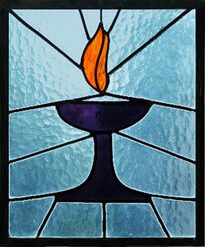Many non-Unitarian Universalists are confused about what our denomination stands for. We are people of many beliefs and backgrounds: people with a religious background, people with none, people who believe in a God, people who don’t, and people who let the mystery be. We have no creed or dogma, and each member is free to search out their own version of the Truth (with or without a capital "T".)
BELIEFS & VALUES
Our faith tradition draws from many sources:
- Direct experience of that transcending mystery and wonder, affirmed in all cultures, which moves us to a renewal of the spirit and an openness to the forces that create and uphold life.
- Words and deeds of prophetic women and men which challenge us to confront powers and structures of evil with justice, compassion and the transforming power of love.
- Wisdom from the world’s religions which inspires us to our ethical and spiritual life.
- Jewish and Christian teachings which call us to respond to God’s love by loving our neighbors as ourselves.
- Humanist teachings which counsel us to heed the guidance of reason and the results of science and warn us against idolatries of mind and spirit.
- Spiritual teachings of Earth-centered religions, which celebrate the sacred circle of life and instruct us to live in harmony with the rhythms of nature.
SEVEN PRINCIPLESUnitarian Universalists affirm and promote seven principles:
|
Unitarian Universalism is an uncommon denomination. If you've ever felt like you were alone in your thinking or that you had ideas you couldn't express in other faith communities, then UUism might be a good fit for you. We support free thinking, equality for all people and environmentally-friendly lifestyles.
Unitarian and Universalist histories date back over 400 years to the Reformation. Universalists, organized in 1793, and Unitarians, organized in 1825, shared a rich heritage of religious liberalism and social concern. The two organizations consolidated in 1961 to form the Unitarian Universalist Association (UUA). Much more about our rich history can be found online at Harvard Square Library - a digital library of UU history, biographies, books and media. We honor many early Unitarians and Universalists, including Thomas Jefferson, Susan B. Anthony, Margaret Sanger and Ralph Waldo Emerson.
For more information, explore the rich resources of our national association - the Unitarian Universalist Association (UUA).
Unitarian and Universalist histories date back over 400 years to the Reformation. Universalists, organized in 1793, and Unitarians, organized in 1825, shared a rich heritage of religious liberalism and social concern. The two organizations consolidated in 1961 to form the Unitarian Universalist Association (UUA). Much more about our rich history can be found online at Harvard Square Library - a digital library of UU history, biographies, books and media. We honor many early Unitarians and Universalists, including Thomas Jefferson, Susan B. Anthony, Margaret Sanger and Ralph Waldo Emerson.
For more information, explore the rich resources of our national association - the Unitarian Universalist Association (UUA).



